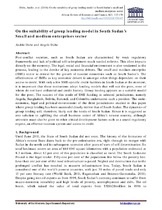| dc.contributor.author | Dube, Andile | |
| dc.contributor.author | Dube, Angelo | |
| dc.date.accessioned | 2018-05-30T11:39:14Z | |
| dc.date.available | 2018-05-30T11:39:14Z | |
| dc.date.issued | 2016 | |
| dc.identifier.citation | Dube, Andile. et al. (2016). On the suitability of group lending model in South Sudan’s small and medium enterprises sector African Review of Economics and Finance, 8(2): 137-170 http://hdl.handle.net/10520/EJC198162 | en_US |
| dc.identifier.issn | 2042-1478 | |
| dc.identifier.uri | https://hdl.handle.net/10520/EJC198162 | |
| dc.identifier.uri | http://hdl.handle.net/10566/3751 | |
| dc.description.abstract | Post-conflict societies, such as South Sudan are characterised by weak regulatory frameworks and lack of political will to implement much needed reforms. This often impacts directly on the economy. The legal, social and financial environment is also weakened in the process, leading to the demise of key economic drivers. The small and medium enterprise (SME) sector is critical for the growth of nascent economies such as South Sudan’s. The effectiveness of SMEs as key economic drivers is amongst other things dependent on their access to credit. With only a few SME-specific credit facilities in South Sudan at the moment, it is important that these institutions adopt funding models that will suit the poor, most of whom do not have collateral and credit history. Group lending appears as a suitable model for the poor. The success of this mode of SME funding in selected jurisdictions, namely Angola, Bangladesh, Bolivia, Burundi, and Colombia underscores such a position. The socio-economic, legal and political environment of the three jurisdictions studied in this paper where group lending has been successful closely mirror that of South Sudan. The dynamics of group lending will, therefore, likely suit the needs of South Sudan. Hence it is suggested as one solution to uplifting the small business sector of Africa’s newest country, although attention must also be given to other critical development factors such as a sound regulatory regime, an effective taxation system and access to credit. | en_US |
| dc.language.iso | en | en_US |
| dc.publisher | The African Finance & Economics Consult | en_US |
| dc.rights | This is the author version of the article published online at: https://hdl.handle.net/10520/EJC198162 | |
| dc.subject | South Sudan | en_US |
| dc.subject | SMEs | en_US |
| dc.subject | Post-Conflict | en_US |
| dc.subject | Economic Growth | en_US |
| dc.subject | Group Lending Model | en_US |
| dc.title | On the suitability of group lending model in South Sudan’s Small and medium enterprises sector | en_US |
| dc.type | Article | en_US |
| dc.privacy.showsubmitter | FALSE | |
| dc.status.ispeerreviewed | TRUE | |
| dc.description.accreditation | DHET | |

